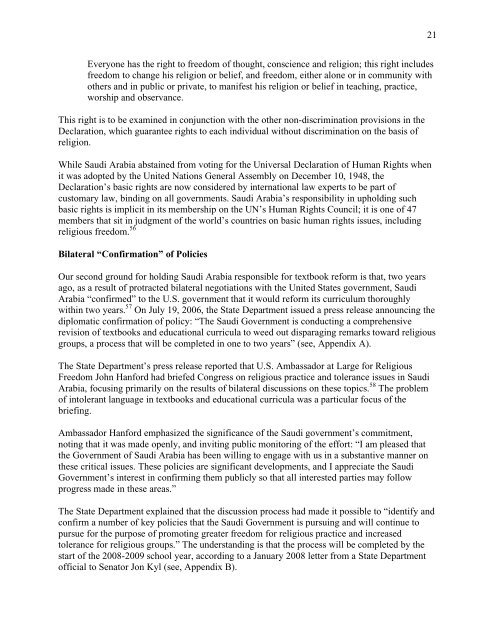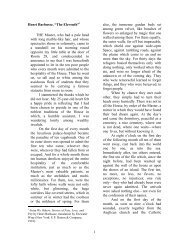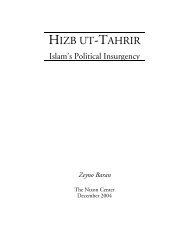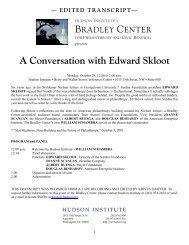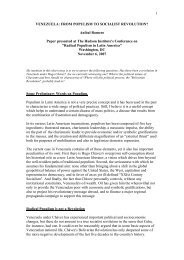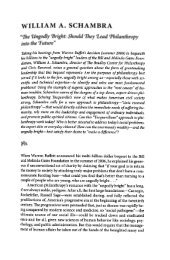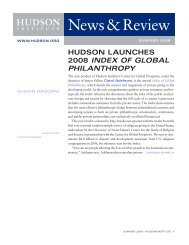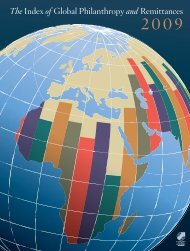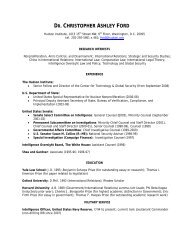Saudi Arabia's Curriculum of Intolerance - Hudson Institute
Saudi Arabia's Curriculum of Intolerance - Hudson Institute
Saudi Arabia's Curriculum of Intolerance - Hudson Institute
You also want an ePaper? Increase the reach of your titles
YUMPU automatically turns print PDFs into web optimized ePapers that Google loves.
21<br />
Everyone has the right to freedom <strong>of</strong> thought, conscience and religion; this right includes<br />
freedom to change his religion or belief, and freedom, either alone or in community with<br />
others and in public or private, to manifest his religion or belief in teaching, practice,<br />
worship and observance.<br />
This right is to be examined in conjunction with the other non-discrimination provisions in the<br />
Declaration, which guarantee rights to each individual without discrimination on the basis <strong>of</strong><br />
religion.<br />
While <strong>Saudi</strong> Arabia abstained from voting for the Universal Declaration <strong>of</strong> Human Rights when<br />
it was adopted by the United Nations General Assembly on December 10, 1948, the<br />
Declaration’s basic rights are now considered by international law experts to be part <strong>of</strong><br />
customary law, binding on all governments. <strong>Saudi</strong> Arabia’s responsibility in upholding such<br />
basic rights is implicit in its membership on the UN’s Human Rights Council; it is one <strong>of</strong> 47<br />
members that sit in judgment <strong>of</strong> the world’s countries on basic human rights issues, including<br />
religious freedom. 56<br />
Bilateral “Confirmation” <strong>of</strong> Policies<br />
Our second ground for holding <strong>Saudi</strong> Arabia responsible for textbook reform is that, two years<br />
ago, as a result <strong>of</strong> protracted bilateral negotiations with the United States government, <strong>Saudi</strong><br />
Arabia “confirmed” to the U.S. government that it would reform its curriculum thoroughly<br />
within two years. 57 On July 19, 2006, the State Department issued a press release announcing the<br />
diplomatic confirmation <strong>of</strong> policy: “The <strong>Saudi</strong> Government is conducting a comprehensive<br />
revision <strong>of</strong> textbooks and educational curricula to weed out disparaging remarks toward religious<br />
groups, a process that will be completed in one to two years” (see, Appendix A).<br />
The State Department’s press release reported that U.S. Ambassador at Large for Religious<br />
Freedom John Hanford had briefed Congress on religious practice and tolerance issues in <strong>Saudi</strong><br />
Arabia, focusing primarily on the results <strong>of</strong> bilateral discussions on these topics. 58 The problem<br />
<strong>of</strong> intolerant language in textbooks and educational curricula was a particular focus <strong>of</strong> the<br />
briefing.<br />
Ambassador Hanford emphasized the significance <strong>of</strong> the <strong>Saudi</strong> government’s commitment,<br />
noting that it was made openly, and inviting public monitoring <strong>of</strong> the effort: “I am pleased that<br />
the Government <strong>of</strong> <strong>Saudi</strong> Arabia has been willing to engage with us in a substantive manner on<br />
these critical issues. These policies are significant developments, and I appreciate the <strong>Saudi</strong><br />
Government’s interest in confirming them publicly so that all interested parties may follow<br />
progress made in these areas.”<br />
The State Department explained that the discussion process had made it possible to “identify and<br />
confirm a number <strong>of</strong> key policies that the <strong>Saudi</strong> Government is pursuing and will continue to<br />
pursue for the purpose <strong>of</strong> promoting greater freedom for religious practice and increased<br />
tolerance for religious groups.” The understanding is that the process will be completed by the<br />
start <strong>of</strong> the 2008-2009 school year, according to a January 2008 letter from a State Department<br />
<strong>of</strong>ficial to Senator Jon Kyl (see, Appendix B).


